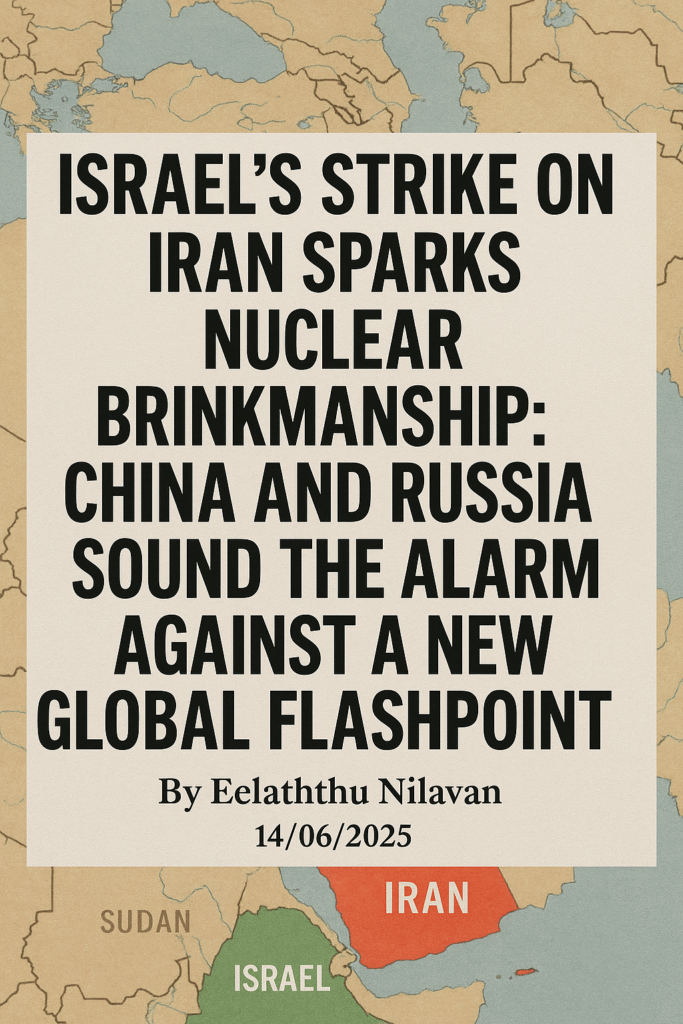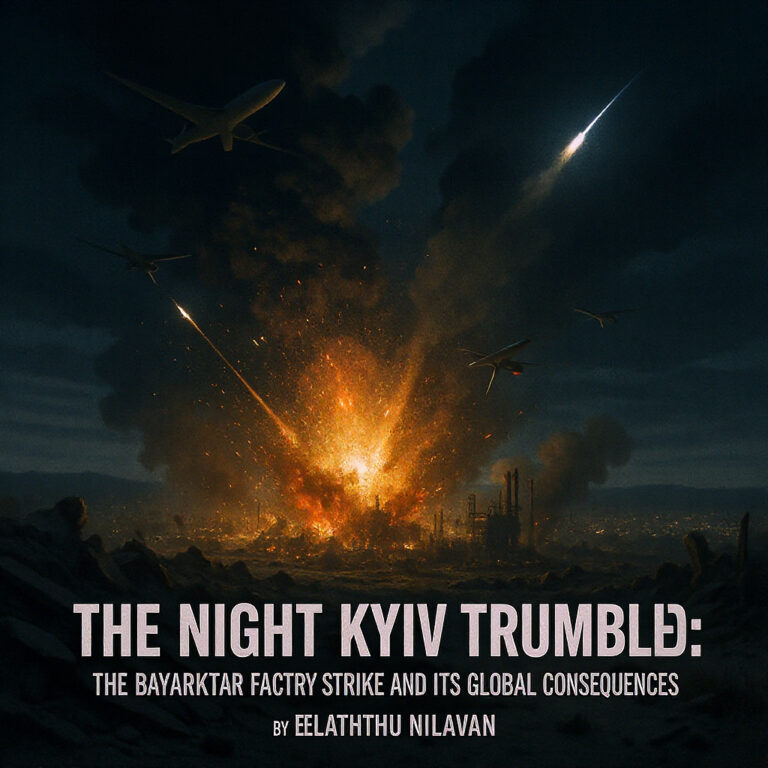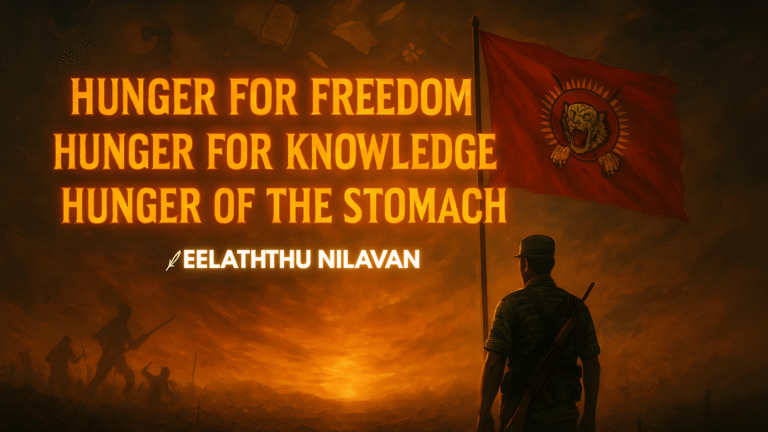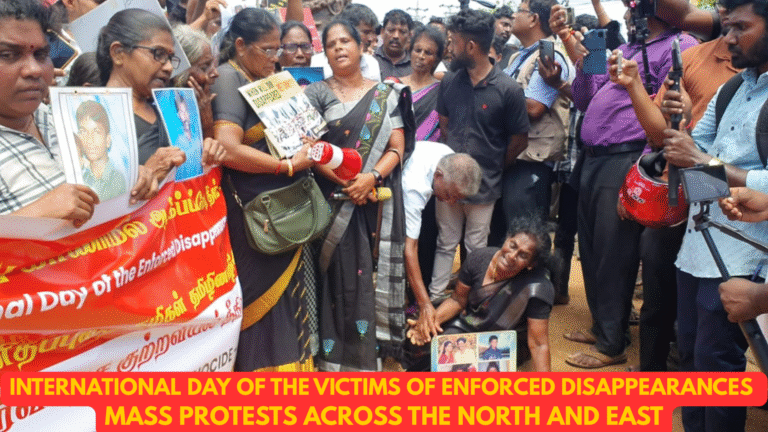Eelaththu Nilavan | World –
Introduction:
In an increasingly volatile Middle East, Israel’s large-scale airstrikes on Iranian territory—reportedly targeting sensitive nuclear infrastructure—have triggered urgent international responses. At a recent emergency session of the United Nations Security Council (UNSC), both Russia and China issued strong condemnations of the Israeli actions, labeling them not only as violations of international law but also as potential triggers of a regional or even nuclear catastrophe. These developments mark a serious escalation in the already tense dynamics of the region, further complicating efforts toward nuclear diplomacy and regional peace.

■. The Airstrikes and Their Implications
Israel’s strike on Iranian soil—particularly near suspected nuclear facilities—raises alarm far beyond routine military confrontation. Although details remain classified, the deliberate targeting of infrastructure tied to Iran’s nuclear program risks significant radioactive and humanitarian fallout. Any damage to such sites not only breaches the protocols of the 1968 Nuclear Non-Proliferation Treaty (NPT) but also introduces the specter of a “nuclear catastrophe,” as warned by Russia’s UN envoy Vassily Nebenzia.
This escalation comes amid existing tensions between Israel and Iran, including Iranian proxies operating across Syria, Lebanon, and Yemen. However, a direct attack on Iranian nuclear installations marks a dangerous red line that could push the region into uncharted, perilous territory.
■. Russia’s Sharp Rebuttal
During the UNSC meeting, Russia’s representative Vassily Nebenzia minced no words. Labeling Israel’s airstrikes a “flagrant violation of international law and Iranian sovereignty,” Nebenzia accused Western powers—especially the United States—of enabling Israeli aggression by offering political cover and military support.
Nebenzia cautioned that continuing along this path could lead to uncontrollable escalation, including potential nuclear risks. His warnings resonate against the backdrop of the broader geopolitical realignment, in which Russia increasingly positions itself as a counterbalance to U.S. and NATO influence in the Middle East.
Russia, currently facing Western isolation over its invasion of Ukraine, finds in Iran a geopolitical ally. Both countries share a strategic interest in resisting Western domination and NATO expansion. Moscow’s condemnation of Israel, therefore, is not only legalistic—it is deeply strategic.
■. China’s Call for Restraint and Sovereignty
Echoing Russia’s stance, China’s foreign ministry issued an unambiguous rebuke of Israel’s actions, labeling the strike a “violation of Iran’s sovereignty, security, and territorial integrity.” China urged Israel to immediately halt its “military adventurism,” emphasizing the need for de-escalation and adherence to international norms.
Beijing reiterated its support for Iran’s right to pursue peaceful nuclear energy under the NPT and stressed that diplomacy—not force—must guide efforts to resolve the Iranian nuclear issue. China’s position aligns with its long-standing doctrine of non-interference, respect for state sovereignty, and multilateral resolution of disputes.
Furthermore, China used the moment to pivot attention to the broader humanitarian crises in the Middle East, especially the situation in Gaza. Calling for a ceasefire, it criticized ongoing Israeli military operations as destabilizing and disproportionate, especially in civilian-populated areas.
■. The Legal and Diplomatic Framework
From a legal perspective, Israel’s preemptive strike violates Article 2(4) of the United Nations Charter, which prohibits the use of force against the territorial integrity or political independence of any state. Unless justified under Article 51 (self-defense), such actions are deemed illegal under international law.
Moreover, attacking nuclear facilities—protected under international conventions such as the Geneva Conventions and safeguarded by the International Atomic Energy Agency (IAEA)—risks setting a dangerous precedent. The IAEA has yet to issue an official response, but any disruption to its monitoring of Iran’s facilities could irreparably damage ongoing diplomatic efforts.
■. Strategic Stakes and Global Alignments
The sharp responses from Russia and China reflect broader strategic shifts in the global order. Both countries are seeking to reshape the post-Cold War balance of power, especially in regions where U.S. influence has long been dominant. Their strong defense of Iran signals an effort to prevent further destabilization in a region critical for energy markets, trade routes, and global security.
This also comes amid China’s efforts to broker peace in the Middle East, including its recent role in restoring diplomatic ties between Iran and Saudi Arabia. A wider war involving Israel and Iran would derail these efforts and damage China’s broader Belt and Road Initiative projects.
■. Fallout for Nuclear Diplomacy
Iran’s nuclear program has long been a focal point of international diplomacy. The 2015 Joint Comprehensive Plan of Action (JCPOA), abandoned by the U.S. under President Trump, was a cornerstone of efforts to prevent Iran from acquiring nuclear weapons. While talks have stalled, any military strikes on Iran’s nuclear sites could kill diplomatic prospects altogether.
Both Russia and China reaffirmed their commitment to Iran’s peaceful use of nuclear energy within NPT constraints and condemned the use of force as a substitute for negotiation. Their unified front may pressure the West to reconsider its approach, especially as U.S.-Iran relations remain severely strained.
■. Broader Regional Consequences
Beyond the nuclear issue, the attack threatens to ignite a wider regional conflict. Iran’s potential retaliation—whether directly or via proxies like Hezbollah or the Houthis—could embroil Lebanon, Syria, Iraq, and even the Gulf States. The already tragic humanitarian crisis in Gaza could be exacerbated, with millions more at risk.
The emerging Israel-Iran confrontation has the potential to collapse the fragile equilibrium across the Middle East, drawing in great powers and complicating the security architecture already under stress from ongoing conflicts in Ukraine and East Asia.
■.Conclusion:
The unified and forceful condemnations by Russia and China at the UNSC reflect the gravity of Israel’s airstrikes on Iranian soil. Beyond violations of international law and the NPT, these attacks threaten to unleash a chain reaction—diplomatic collapse, nuclear escalation, and regional war. As two of the five permanent Security Council members, Russia and China are positioning themselves as defenders of multilateralism, sovereignty, and stability, albeit not without strategic self-interest.
What unfolds next will depend not just on Iran and Israel’s military calculations but also on whether the international community can act decisively to uphold international law, protect global nuclear agreements, and prevent another catastrophic Middle Eastern war.
□ Eelaththu Nilavan □
14/06/2025
The views expressed in this article are the author’s own and do not necessarily reflect Amizhthu’s editorial stance.




